The British journalist, editor and cycling activist Carlton Reid is in the process of finalizing a "massive free e-book" due for publication this Spring at http://www.roadswerenotbuiltforcars.com/. His book provides valuable  historical background on how we in Britain and the United States got into the present no-choice single-mode road systems that have provided the authoritarian main model for the fast (and less fast) developing countries as they rush to urbanization. The lessons of history, if learned, can, we are told, help us better understand the present and on that firm base decide what we wish to become in the future. So with thanks to Carlton Reid let's see if we can learn this particular hard lesson from Britain:
historical background on how we in Britain and the United States got into the present no-choice single-mode road systems that have provided the authoritarian main model for the fast (and less fast) developing countries as they rush to urbanization. The lessons of history, if learned, can, we are told, help us better understand the present and on that firm base decide what we wish to become in the future. So with thanks to Carlton Reid let's see if we can learn this particular hard lesson from Britain:
Thursday, January 31, 2013
Op-Ed: Hard-earned road lessons from Britain
Wednesday, January 30, 2013
SEARCH FOR A CITIZEN APP: "CLICK-TO-FIX"
 For my colleagues in the city of Lyon, I am trying to give them a reference for an app which permits citizens to identify and report on problems on the streets in very specific and convenient ways. Here is how it might/should work:
For my colleagues in the city of Lyon, I am trying to give them a reference for an app which permits citizens to identify and report on problems on the streets in very specific and convenient ways. Here is how it might/should work:
Friday, January 25, 2013
Public transport riders wide open to infection by parasites and viruses
Just when we thought we were finally starting to figure out how to make a major shift to public transport, this troubling article shows up in the main paper in Tallinn Estonia, at the time of their introduction of a new program to create FFPT Fare Free Public Transport. Now someone has to figure out how to offer Germ Free Public Transport. GFPT. Quite seriously. Where do we start to work out way through this one? Have a look and tell us what you think about it.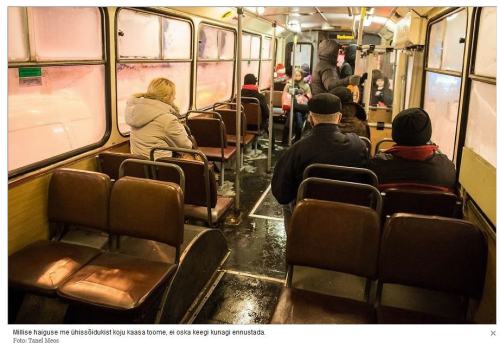
Tuesday, January 22, 2013
Slaughtering, stinking engines of iniquity
Carlton Reid is writing a book about roads history. He's focusing on the period 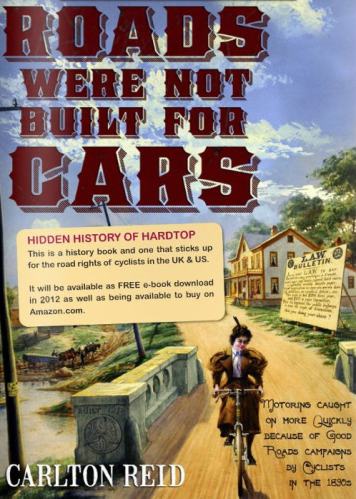 1880-1905, which saw the Bicycling Boom and then – pop – the start of Motoring Mania. Examining tangents, finding new areas to explore, digging out deeper and more convincing evidence to show that cyclists had far more influence on government road policies than previously thought. Not just previously thought by the public at large, but by social history and transport academics, too. In today's W/S article he shares with us some of the historical quotes he has uncovered, which relate in important ways to the matters which concern us here. Let's have a look at a selection of these.
1880-1905, which saw the Bicycling Boom and then – pop – the start of Motoring Mania. Examining tangents, finding new areas to explore, digging out deeper and more convincing evidence to show that cyclists had far more influence on government road policies than previously thought. Not just previously thought by the public at large, but by social history and transport academics, too. In today's W/S article he shares with us some of the historical quotes he has uncovered, which relate in important ways to the matters which concern us here. Let's have a look at a selection of these.
Op-Ed. Italian Perspectives on Carsharing: Past Practices, Future Prospects
 This report on carsharing history, practices and prospects in Italy is contributed by Carlo Iacovini who has been one of the most active figures in the development of the industry in Italy since he became actively involved in planning and developing new carsharing systems in 1996.
This report on carsharing history, practices and prospects in Italy is contributed by Carlo Iacovini who has been one of the most active figures in the development of the industry in Italy since he became actively involved in planning and developing new carsharing systems in 1996.
Sunday, January 20, 2013
Weekend musing: On Nixon in China
While musing about China these days, and particularly about how they are handling policy and invement decisions involviing transport, mobility and public space during this period of possible change of thinking at the highest policy levels there (See World Streets http://wp.me/psKUY-2Kb), I am listening this weekend once again, decades later, to the still surprising Nixon in China of John Adams. And wondering how my Chinese friends might react to this.
Friday, January 18, 2013
Op-Ed: Think again about China and Innovation
This is excellent piece of analytic work by a young Canadian scholar, strips away many of the all too easy myths about China and Chinese copycat culture, and puts before us quite a different picture of their competitive potential for a very different future. . Let me quote the author's opening paragraph which does a good job of setting the stage for what follows. Conversations about innovation in the United States are rife with the adversarial language of exceptionalism. Rather than view China’s economic rise as a threat, American businesses and policy makers should take an open-minded look at the Chinese national innovation system. Innovation, according to the Chinese, should be in service of overcoming social and environmental challenges, not only generating prosperity and new inventions. And rather than viewing innovation as an individual pursuit, the Chinese recognize the necessity of a strong government role.
Conversations about innovation in the United States are rife with the adversarial language of exceptionalism. Rather than view China’s economic rise as a threat, American businesses and policy makers should take an open-minded look at the Chinese national innovation system. Innovation, according to the Chinese, should be in service of overcoming social and environmental challenges, not only generating prosperity and new inventions. And rather than viewing innovation as an individual pursuit, the Chinese recognize the necessity of a strong government role.
And from this end I want to transpose this message specifically to the transport sector as it concerns us here at World Streets. If in the past we have seen that the Chinese response to their rapid city growth and exploding transportation requirements has been to mimic the (worst of) the West yard by yard, can we reasonably assume that they will continue on such a path in the future? I for one doubt it, so let’s keep a weather eye on the new generation of problem-solvers, solutions and approaches they are going to put to work. Since we all surely will have a great deal to learn from them. But now let's hear what Eric Kennedy has to say about China's new national innovation system:
Wednesday, January 16, 2013
Announcing World Streets Editions
Announcing World Streets Editions (The Plan)
World Streets Editions is at present a start-up project under study whose purpose is to work with international authors with high expertise in their fields and publish highly readable and affordable pocket books on the topics of sustainable transport, sustainable cities and sustainable lives. To this extent it will generally reflect the scope and values found over these last years in World Streets. We are also looking at publishing children's books and possibly other media dealing with these topics in imaginative ways.
--> Read on:
Tuesday, January 15, 2013
Homo Urbanus

Photographer unknown but picture relayed by Micha Walter, who writes (in German, of which this is the Google translation):
"Homo urbanus" is the latest scientific findings. forerunner of modern "homo economicus", considered the most radical species of hominid
--> Read on:
Monday, January 14, 2013
Streetsblog: Doing its job year after year in New York City. In memoriam 2012
Each year our friends over at Streetsblog in New York City publish a heart-rending testimonial to the mayhem that automobiles have wrought over the year on their city's streets and the cost in terms of lives lost by innocent pedestrians and cyclists. Put ting names, faces and human tragedy to what otherwise takes the form of dry numbers, faceless hence quickly forgettable statistics is an important task. We can only encourage responsible citizens and activists in every city on the planet to do the same thing, holding those public officials (and let's not forget, we call them "public servants", and for excellent reason) responsible for what goes on under their direct control.
ting names, faces and human tragedy to what otherwise takes the form of dry numbers, faceless hence quickly forgettable statistics is an important task. We can only encourage responsible citizens and activists in every city on the planet to do the same thing, holding those public officials (and let's not forget, we call them "public servants", and for excellent reason) responsible for what goes on under their direct control.
Saturday, January 12, 2013
Weekend Musing: Asking the mayor of Freedonia to walk the walk
Asking the mayor of Freedonia to walk the walk
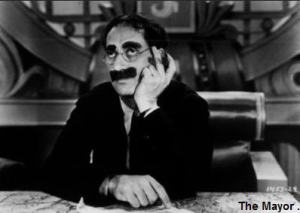 Freedonia City Hall, 12-Jan-13.09:00. The mayor is comfortably seated at his imposing desk, looking fondly at an unlit cigar. The editor of World Streets knocks lightly and waits timidly at the door, entirely drenched and more than a bit disheveled. Not a pretty sight.
Freedonia City Hall, 12-Jan-13.09:00. The mayor is comfortably seated at his imposing desk, looking fondly at an unlit cigar. The editor of World Streets knocks lightly and waits timidly at the door, entirely drenched and more than a bit disheveled. Not a pretty sight.The Mayor: Well sir, you are a fine mess. Careful, you are dripping on my favorite chair.
 --> Read on:
--> Read on:
Thursday, January 10, 2013
Op-Ed: Where Does SLoCaT Stand in Realizing Sustainable Transport?
Three years ago the Partnership on Sustainable, Low Carbon Transport  (SLoCaT) was established to address the relative absence of sustainable transport in the global discussions on sustainable development and climate change. Rapid motorization in the developing world and its negative impacts motivated the organizations that came together in SLoCaT. There was agreement that SLoCaT should initially have a mandate for three years only and that by the end of 2012 a decision would be made whether to call it a day or to go on, possibly, with a revised mission. Those three years have gone by. So where is SLoCaT now and what is next; declare victory and move on, admit defeat and move on, or stay in the fight?
(SLoCaT) was established to address the relative absence of sustainable transport in the global discussions on sustainable development and climate change. Rapid motorization in the developing world and its negative impacts motivated the organizations that came together in SLoCaT. There was agreement that SLoCaT should initially have a mandate for three years only and that by the end of 2012 a decision would be made whether to call it a day or to go on, possibly, with a revised mission. Those three years have gone by. So where is SLoCaT now and what is next; declare victory and move on, admit defeat and move on, or stay in the fight?
Did someone say, White Chairs?
Did someone say, White Chairs?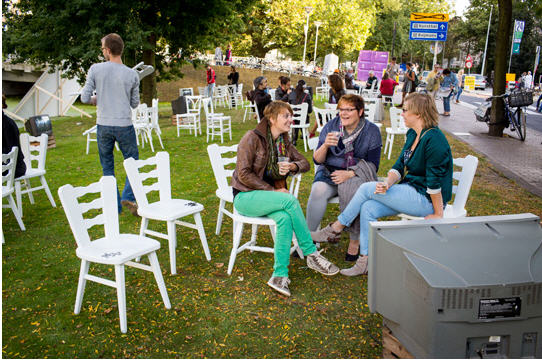 During Rotterdam’s public art festival Wereld van Witte de With, urbanism office M.E.S.T. reanimated this idea. But instead of bikes, the designers left 350 white chairs in public space in Rotterdam. The chairs served as a terrace for all the decentralized performances, and fed a discussion about public space and ownership at the same time. People were allowed to use the white chairs freely and to take them to any other location as long as they remained part of public space. The white chairs were slowly spread across the city. According to the festival organization, they were even spotted at the Central Station of Leiden, a town somewhere between Rotterdam and Amsterdam.
During Rotterdam’s public art festival Wereld van Witte de With, urbanism office M.E.S.T. reanimated this idea. But instead of bikes, the designers left 350 white chairs in public space in Rotterdam. The chairs served as a terrace for all the decentralized performances, and fed a discussion about public space and ownership at the same time. People were allowed to use the white chairs freely and to take them to any other location as long as they remained part of public space. The white chairs were slowly spread across the city. According to the festival organization, they were even spotted at the Central Station of Leiden, a town somewhere between Rotterdam and Amsterdam.
Monday, January 7, 2013
To support the Tallinn FTP project, World Streets readers comment on Free Public Transport
In June of 2012 your editor was invited by the mayors of Tallinn to give a public talk 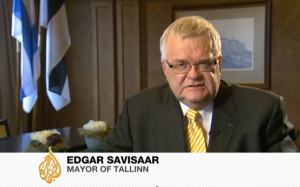 to comment on how some of the policy concepts developed over the last two decades under the New Mobility Consult program might be put to work to support their decision to take new approaches to transport policy challenges starting in 2013. Subsequent to that visit we signed with the City of Tallinn a public agreement of strategic cooperation over 2013.
to comment on how some of the policy concepts developed over the last two decades under the New Mobility Consult program might be put to work to support their decision to take new approaches to transport policy challenges starting in 2013. Subsequent to that visit we signed with the City of Tallinn a public agreement of strategic cooperation over 2013.
The first transformative event they were considering for 2013 was the first-ever Free Public Transport project in a European capital. After careful planning their project went into service on 1 January. In the run-up to this important event World Streets in cooperation with our readers has been developing and drawing to the city's attention a broad repertory of expert comments on FPT, all of which you can see at http://worldstreets.wordpress.com/category/free-public-transport/. We invited contributing editor Anzir Boodoo to read through the various comments and see if he could put them in some kind of order for our busy readers in a single article, which you can now read here.
World Streets Social Networking ABCs
In our world-wide outreach to readers we are trying to put to work the full range  of available contact and sharing tools to best serve and to make best use of these carefully developed networks. Among them a certain number of Facebook Groups which seem to lend themselves pretty well to these purposes, and also LinkedIn, Google+, YouTube, Scribd, Picasa (public photo galleries) and Twitter (still something of which we are hard pressed to see the fit, but one perseveres).
of available contact and sharing tools to best serve and to make best use of these carefully developed networks. Among them a certain number of Facebook Groups which seem to lend themselves pretty well to these purposes, and also LinkedIn, Google+, YouTube, Scribd, Picasa (public photo galleries) and Twitter (still something of which we are hard pressed to see the fit, but one perseveres).
Sunday, January 6, 2013
Behind the Rape in the Bus
Behind the Rape in the Bus
Over at India Streets today - http://www.facebook.com/IndiaStreets - the
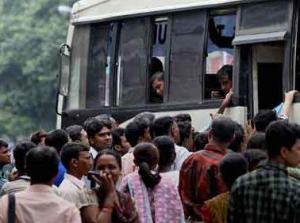 distinguished Indian journalist and writer, Vidyadhar Date, posts an article entitled "Rosa Parks, The Power of Resistance and the Rape In The Bus In Delhi". He makes a point which I believe is central to understanding a great part of both (a) the what and (b) the why of this tragic event in Delhi, when he writes:
--> Read on:
distinguished Indian journalist and writer, Vidyadhar Date, posts an article entitled "Rosa Parks, The Power of Resistance and the Rape In The Bus In Delhi". He makes a point which I believe is central to understanding a great part of both (a) the what and (b) the why of this tragic event in Delhi, when he writes:
--> Read on:
Thursday, January 3, 2013
2013 Book announcement: NO (MORE) EXCUSES
Memorandum: First background on book in process to appear end-2013.
No ExcuseS, Sir!
(A tale of cities, indolence, complexity and finally . . . simplicity)
Introduction: No Excuses is a book in progress by Eric Britton about cities and people, and how we get around in our day-to-day lives. It is about the failure of a generation -- but also how with a little imagination and a lot of willpower we can do it better on all scores, and in a way that is fairer for all.
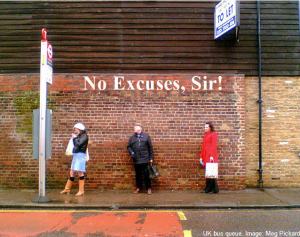 If we say it is about cities and not transport, it is because the focus is not on the usual transport infrastructure, technology or big investments of hard-earned taxpayer money. That is the old way of looking at it, the mindset that effectively dominated transport policy and practice in the 20th century and which is just starting to lose its hold today. Good things are happening but still in far too few places. These are the places and projects, and the people and strategies, that No Excuses is all about.
If we say it is about cities and not transport, it is because the focus is not on the usual transport infrastructure, technology or big investments of hard-earned taxpayer money. That is the old way of looking at it, the mindset that effectively dominated transport policy and practice in the 20th century and which is just starting to lose its hold today. Good things are happening but still in far too few places. These are the places and projects, and the people and strategies, that No Excuses is all about. --> Read on:
--> Read on:
Tuesday, January 1, 2013
Happy New Year . . . and what BTW is this "New Mobility Agenda" business all about?
To kick off the New Year, it would seem like a good idea for us to remind our 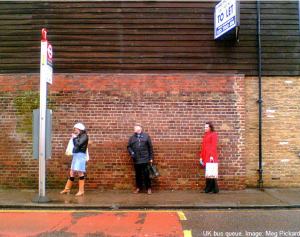 readers and contributors (and ourselves) of what we think this phrase means. This is important here since these three words are at the core of what World Streets is all about, as well as the main meat of our in-process collaborative book for 2013, No Excuses, Sir! A tale of cities, indolence, complexity and, finally, simplicity.
readers and contributors (and ourselves) of what we think this phrase means. This is important here since these three words are at the core of what World Streets is all about, as well as the main meat of our in-process collaborative book for 2013, No Excuses, Sir! A tale of cities, indolence, complexity and, finally, simplicity.




